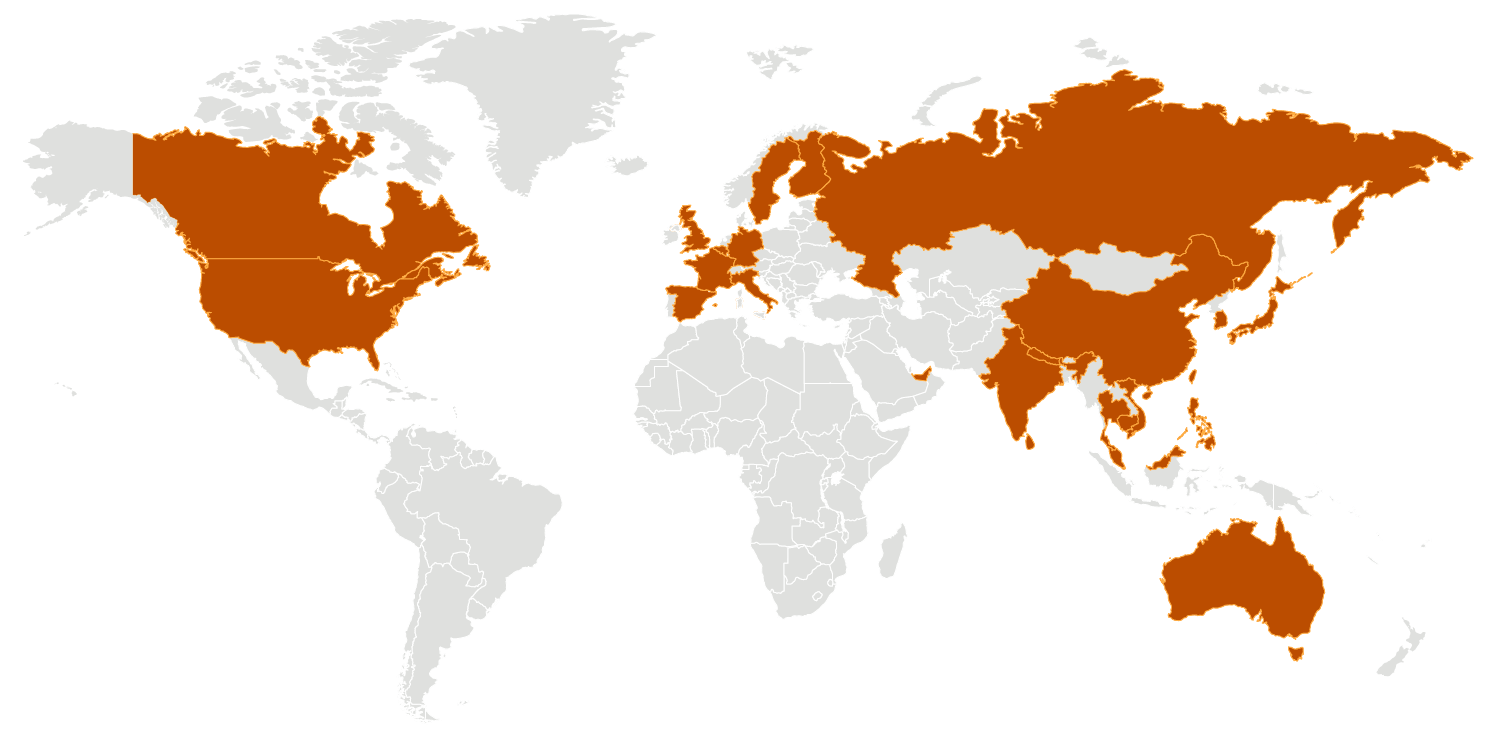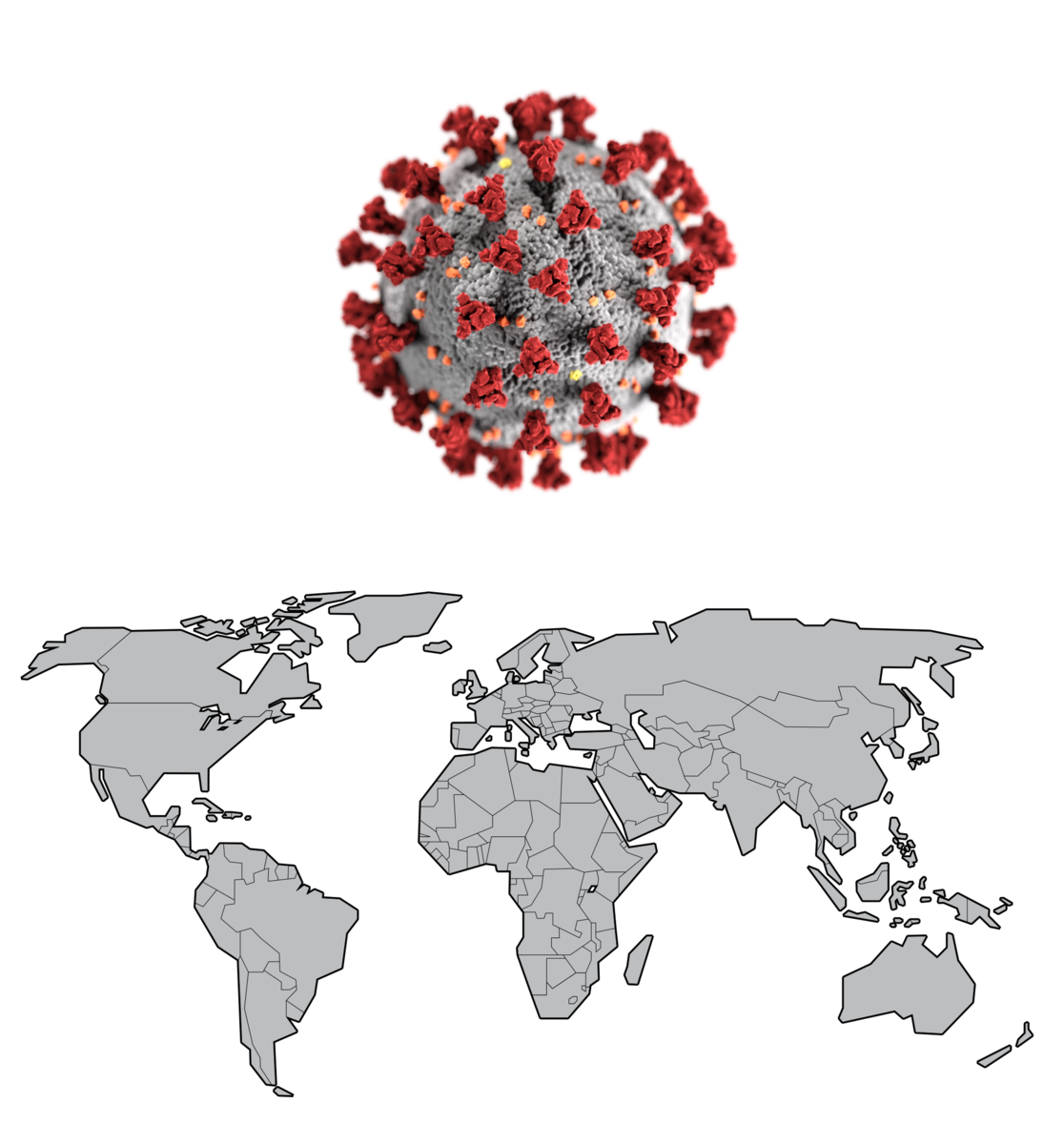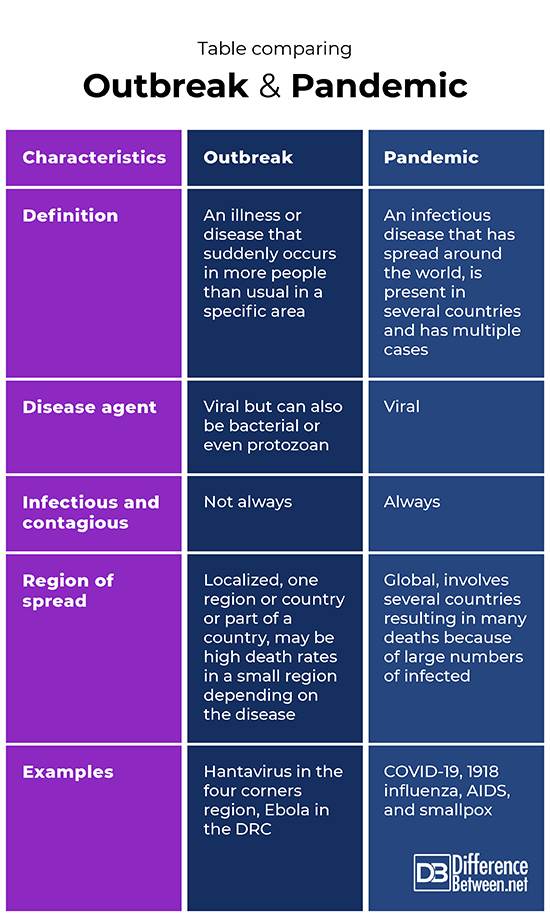Difference Between Outbreak and Pandemic
An outbreak is defined as an illness that is suddenly more prevalent in a particular area than it usually is. A pandemic is defined as an illness that has spread worldwide and caused many cases of illness with several deaths.

What is Outbreak?
Definition:
An outbreak is a term used to describe an illness or disease that suddenly occurs in more people than usual in a specific region. It is not a global phenomenon and usually occurs in one country or part of a country.
Causes of outbreaks:
Outbreaks are not only caused by viruses, however, many are. Viral illnesses such as Ebola on occasion occur as outbreaks in certain parts of Africa, such as Sierra Leona and the DRC. Some viral outbreaks occur because some people do not vaccinate, so there have been recent outbreaks of measles and mumps in some countries. Malaria is caused by a protozoa parasite and it is responsible for outbreaks in some areas of the world. Even food poisoning events can be classified as outbreaks, and are the result of pathogenic bacteria contaminating food or drink.
Examples of outbreaks:
Outbreaks of illness occur every year in various parts of the world. Examples include Hantavirus in the four corners region of the United States, Ebola in the DRC and Sierra Leone, and various measles outbreaks that have occurred in some countries and in certain regions of the United States.
Staying safe in an outbreak:
It is fairly easy to avoid becoming ill if you do not live an area where there currently is an outbreak. Travelers need to take note of any information on outbreaks around the world and avoid travel to such areas. If you are living in an area where there is an outbreak, you need to avoid contact with people who are ill in the case of infectious diseases. For outbreaks of certain diseases one should ensure vaccinations are up to date to avoid catching illness from unvaccinated people.

What is Pandemic
Definition:
A pandemic is a term used when an infectious disease has spread around the world, is present in several countries and has multiple cases and causes some deaths.
Causes of pandemics:
Pandemics are caused by viruses that are infectious and easily spread person to person. The pandemics are also often caused by viruses of the respiratory tract which can spread via droplets, for example, influenza and coronavirus. Viruses mutate often and can’t be easily treated and thus are often a problem world-wide. Pandemics are also more likely today because of improved transportation methods, with air travel making it easy and quick for people to fly from intercontinentally. Generally, viral illnesses that become pandemics are caused by very contagious viruses that are easily spread and difficult to contain.
Examples of pandemics:
The current pandemic, COVID-19, caused by a type of coronavirus is the best example people can relate to, and because so many people are infected, the mortality world-wide, is increasing rapidly. However, there were pandemics in the past including the 1918 influenza which is estimated to have killed over 20 million people at least. Smallpox and AIDS have also caused pandemics.
Staying safe in a pandemic:
Avoiding crowds and maintaining social distances are some measures that can help. Pandemics are usually viruses that spread easily from person to person. Hand-washing measures, improved sanitation, washing of surfaces and wearing masks in public are all current recommendations. It is also smart to avoid hot spots or areas where there is a lot of disease so as to reduce your risk of infection.
Difference between Outbreak and Pandemic?
Definition
An outbreak describes an illness or disease that suddenly occurs in more people than usual in a particular area or part of the world. A pandemic describes an infectious disease that has spread around the world, is present in several countries and has multiple cases and deaths.
Disease agent
The agent of illness in the case of an outbreak can be a virus but can also be bacteria or even protozoa. The agent of illness in the case of a pandemic is always a virus that is very contagious.
Infectious and contagious
An illness causing an outbreak is not always contagious, since food poisoning is a type of outbreak which is not transmitted among people. A pandemic is almost always due to a highly contagious infectious virus.
Region of spread
In the case of an outbreak, the region of spread is always very localized and limited to one region or country or part of a country. In the case of a pandemic, the spread of the illness is global, involves several countries resulting in many deaths because of large numbers of infected people.
Examples
Four corners region Hantavirus and Ebola in the DRC are both examples of outbreaks. The 1918 influenza, AIDS, smallpox and COVID-19 are all examples of pandemics.
Table comparing Outbreak and Pandemic

Summary of Outbreak Vs. Pandemic
- The terms outbreak and pandemic are both used by epidemiologists when describing illness in a population.
- An outbreak is the localized occurrence of an illness or disease that is not necessarily caused by a virus, but can also be caused by bacteria or even protozoa.
- A pandemic describes the global occurrence of an illness that is viral in nature and transmitted from person to person, and may be severe.
- Pandemics can cause large numbers of people to die because so many are infected around the world.
- Outbreaks can cause high death rates at a local level depending on the disease agent involved.
- Difference Between Rumination and Regurgitation - June 13, 2024
- Difference Between Pyelectasis and Hydronephrosis - June 4, 2024
- Difference Between Cellulitis and Erysipelas - June 1, 2024
Search DifferenceBetween.net :
Leave a Response
References :
[0]Bedford, Juliet, et al. "COVID-19: towards controlling of a pandemic." The Lancet 395.10229 (2020): 1015-1018.
[1]Mills, Christina E., James M. Robins, and Marc Lipsitch. "Transmissibility of 1918 pandemic influenza." Nature 432.7019 (2004): 904-906.
[2]Parpia, Alyssa S., et al. "Effects of response to 2014–2015 Ebola outbreak on deaths from malaria, HIV/AIDS, and tuberculosis, West Africa." Emerging infectious diseases 22.3 (2016): 433.
[3]Image credit: https://commons.wikimedia.org/wiki/File:Outbreak-coronavirus-world-large.png
[4]Image credit: https://commons.wikimedia.org/wiki/File:Coronavirus_pandemic.png
